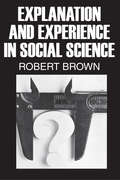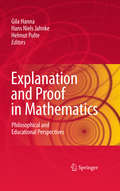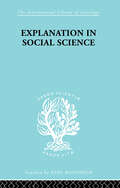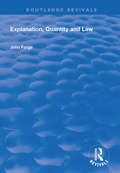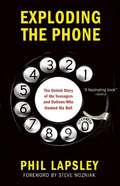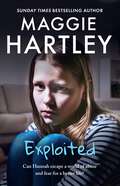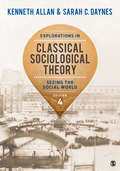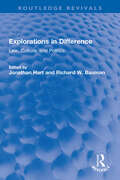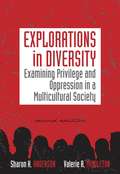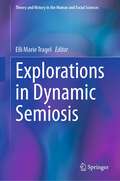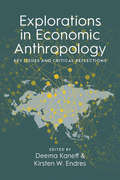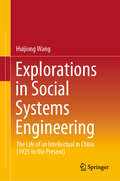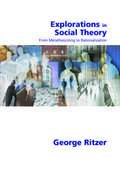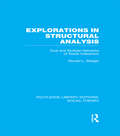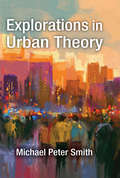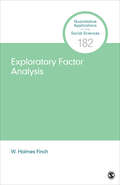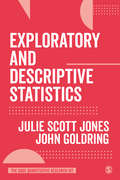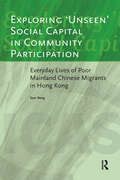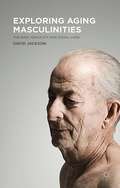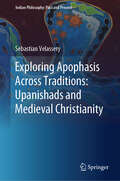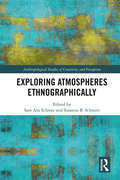- Table View
- List View
Explanation and Experience in Social Science
by Robert BrownAccording to their critics, social scientists rarely ask the right questions and cannot provide satisfactory answers even to the questions they ask themselves. Social scientists often discuss the nature of knowledge in their fields with a notable lack of clarity. Explanation and Experience in Social Science by Robert Brown dispels the confusion with cogency and wit; it is a systematic, sensible, and lucid analysis of the nature of the explanations put forward by social scientists.Explanation-making is first distinguished from "describing" and "reporting," and then classified into different types, based on different kinds of information used. The greater part of the book consists in discussion and examination of these types of explanation and their relationships, in which the usefulness and limitations of each are assessed. An extraordinary variety of examples from contemporary work in all the social sciences is used, including the fields of sociology, anthropology, psychology, history, demography, political science. and economics. The author makes it clear that good social explanation is possible and that it conforms to the requirements of all good scientific explanation.Explanation and Experience in Social Science is of interest to the practicing scientist--in fact--it is a must-have for any personal or public library with collections in the social sciences. Most studies in the philosophy of the sciences, natural and social, fall into two distinct groups: those written by philosophers for other philosophers and those produced by scientists for their fellow-scientists. The aim of this book is to discuss questions of philosophical interest as they come to be imbedded in the work of social scientists.
Explanation and Proof in Mathematics
by Helmut Pulte Hans Niels Jahnke Gila HannaIn the four decades since Imre Lakatos declared mathematics a "quasi-empirical science," increasing attention has been paid to the process of proof and argumentation in the field -- a development paralleled by the rise of computer technology and the mounting interest in the logical underpinnings of mathematics. Explanantion and Proof in Mathematics assembles perspectives from mathematics education and from the philosophy and history of mathematics to strengthen mutual awareness and share recent findings and advances in their interrelated fields. With examples ranging from the geometrists of the 17th century and ancient Chinese algorithms to cognitive psychology and current educational practice, contributors explore the role of refutation in generating proofs, the varied links between experiment and deduction, the use of diagrammatic thinking in addition to pure logic, and the uses of proof in mathematics education (including a critique of "authoritative" versus "authoritarian" teaching styles). A sampling of the coverage: The conjoint origins of proof and theoretical physics in ancient Greece. Proof as bearers of mathematical knowledge. Bridging knowing and proving in mathematical reasoning. The role of mathematics in long-term cognitive development of reasoning. Proof as experiment in the work of Wittgenstein. Relationships between mathematical proof, problem-solving, and explanation. Explanation and Proof in Mathematics is certain to attract a wide range of readers, including mathematicians, mathematics education professionals, researchers, students, and philosophers and historians of mathematics.
Explanation in Social Science (International Library of Sociology)
by Robert BrownFirst published in 1998. Routledge is an imprint of Taylor & Francis, an informa company.
Explanation, Quantity and Law (Routledge Revivals)
by John ForgePublished in 1999, this work sets out to give an account of explanation which is adequate to the problems that arise when looking at physical science. It offers a theory of explanation with supporting analysis, and also an application to the task of giving an account of explanation in quantum mechanics.
Exploding the Phone: The Untold Story of the Teenagers and Outlaws Who Hacked Ma Bell
by Philip LapsleyBefore smartphones, back even before the Internet and personal computer, a misfit group of technophiles, blind teenagers, hippies, and outlaws figured out how to hack the world's largest machine: the telephone system. Starting with Alexander Graham Bell's revolutionary "harmonic telegraph," by the middle of the twentieth century the phone system had grown into something extraordinary, a web of cutting-edge switching machines and human operators that linked together millions of people like never before. But the network had a billion-dollar flaw, and once people discovered it, things would never be the same. Exploding the Phone tells this story in full for the first time. It traces the birth of long-distance communication and the telephone, the rise of AT&T's monopoly, the creation of the sophisticated machines that made it all work, and the discovery of Ma Bell's Achilles' heel. Phil Lapsley expertly weaves together the clandestine underground of "phone phreaks" who turned the network into their electronic playground, the mobsters who exploited its flaws to avoid the feds, the explosion of telephone hacking in the counterculture, and the war between the phreaks, the phone company, and the FBI. The product of extensive original research,Exploding the Phone is a ground-breaking, captivating book.
Exploited: The heartbreaking true story of a teenage girl trapped in a world of abuse and violence
by Maggie HartleyFourteen-year-old Hannah comes to live with foster carer Maggie Hartley after her mum pleads with Social Services to take her into care, unable to cope with her daughter anymore. Previously a good student, a loving daughter and sister, Hannah is now playing truant, drinking, and taking drugs. Angry and mistrustful, it seems that nobody can reach this troubled teenager.Maggie is used to difficult teenagers, but Hannah's behaviour brings into question everything Maggie has ever learnt in all her years as a foster carer. Determined to push away everyone around her away, Hannah's life seems to be spiralling out of control. But when Hannah finally breaks down and confides a shocking secret to Maggie, the truth behind her chaotic behaviour is finally revealed. Can Maggie help this vulnerable young girl overcome the trauma of what's happened to her and set her free from the demons that haunt her?
Exploited: The heartbreaking true story of a teenage girl trapped in a world of abuse and violence (A Maggie Hartley Foster Carer Story)
by Maggie HartleyFourteen-year-old Hannah comes to live with foster carer Maggie Hartley after her mum pleads with Social Services to take her into care, unable to cope with her daughter anymore. Previously a good student, a loving daughter and sister, Hannah is now playing truant, drinking, and taking drugs. Angry and mistrustful, it seems that nobody can reach this troubled teenager.Maggie is used to difficult teenagers, but Hannah's behaviour brings into question everything Maggie has ever learnt in all her years as a foster carer. Determined to push away everyone around her away, Hannah's life seems to be spiralling out of control. But when Hannah finally breaks down and confides a shocking secret to Maggie, the truth behind her chaotic behaviour is finally revealed. Can Maggie help this vulnerable young girl overcome the trauma of what's happened to her and set her free from the demons that haunt her?
Explorations in Classical Sociological Theory: Seeing the Social World
by Kenneth Allan Sarah DaynesPraised for its conversational tone, personal examples, and helpful pedagogical tools, the Fourth Edition of Explorations in Classical Sociological Theory: Seeing the Social World is organized around the modern ideas of progress, knowledge, and democracy. With this historical thread woven throughout the chapters, the book presents a diverse selection of major classical theorists including Marx, Spencer, Durkheim, Weber, Mead, Simmel, Martineau, Gilman, Douglass, Du Bois, Parsons, and the Frankfurt School. Kenneth Allan and new co-author Sarah Daynes focus on the specific views of each theorist, rather than schools of thought, and highlight modernity and postmodernity to help contemporary readers understand how classical sociological theory applies to their lives.
Explorations in Classical Sociological Theory: Seeing the Social World
by Kenneth Allan Sarah DaynesPraised for its conversational tone, personal examples, and helpful pedagogical tools, the Fourth Edition of Explorations in Classical Sociological Theory: Seeing the Social World is organized around the modern ideas of progress, knowledge, and democracy. With this historical thread woven throughout the chapters, the book presents a diverse selection of major classical theorists including Marx, Spencer, Durkheim, Weber, Mead, Simmel, Martineau, Gilman, Douglass, Du Bois, Parsons, and the Frankfurt School. Kenneth Allan and new co-author Sarah Daynes focus on the specific views of each theorist, rather than schools of thought, and highlight modernity and postmodernity to help contemporary readers understand how classical sociological theory applies to their lives.
Explorations in Difference: Law, Culture, and Politics (Routledge Revivals)
by Jonathan Hart Richard W. BaumanFirst published in 1996, Explorations in Difference explores how contemporary debates over identity and difference come into play within the workings of cultural, legal, and political institutions. The book brings together a variety of perspectives on the meanings and implications of difference in the context of postmodern theory. It is divided into two parts: ‘Theoretical Accounts’, which establishes a context for postmodern inquiries into difference, and ‘Instances’, which provides application to particular issues. Highly interdisciplinary, Explorations in Difference continues to have lasting relevance and will appeal to those with an interest in postmodern difference and its implications.
Explorations in Diversity: Examining Privilege and Oppression In A Multicultural Society (Second Edition)
by Sharon K. Anderson Valerie A. MiddletonThis unique text features personal accounts from mental health professionals, professors and students facing issues of privilege and oppression in our diverse society. In this collection of articles, writers discuss discoveries and experiences about their own privileges and oppression, and ultimately, the compassion they've developed for individuals confronted with discrimination. Each essay will inspire you to reflect on your own encounters with privilege and oppression, while discussion questions at the end of each story provide an opportunity to process these issues on a personal level. By studying these revealing stories of insight and understanding, you'll learn how to recognize, examine, and finally, come to terms with your own privileges and discrimination -- allowing you to become a stronger, more acute, and more effective practitioner of the helping professions.
Explorations in Dynamic Semiosis (Theory and History in the Human and Social Sciences)
by Elli Marie TragelThis anthology is a manifold combining semiotics and psychology. Chapters in the book are authored by young scholars making sense of semiosis in irreversible time from a multitude of perspectives. The central focus on the dynamics of meaning-making comes together in a variety of topics that align in the core idea of dynamic nature of human making and use of signs. First, this book gives a comprehensive overview of relational dynamics of the sign. The overview is followed by a collection of chapters focusing on various topics relevant for humanities and social sciences, such as experience of time, (cultural) memory, musical signification, human-computer interactions, death and eternity, freedom and responsibility, authenticity, methods for practice and research in psychology, etc. This anthology contributes to the integration of the fields of semiotics and psychology, building on the classic traditions of the Tartu-Moscow School of Semiotics (established by Juri Lotman) and contemporary cultural psychology that has unified social sciences in the recent three decades. Examples of how new semiotic models are applied to various domains of human lives will be given, anticipating the future and addressing its past. As such, this book is a relevant read for everyone interested in the complex nature of meaning-making, and inclusion of dynamics in all expressions of life, including academic research.
Explorations in Economic Anthropology: Key Issues and Critical Reflections
by Kirsten W. Endres Deema KaneffAt a time of rising global economic precarity and social inequality, the field of economic anthropology offers solutions through the study of local and contextualized economic practices. This book is made up of an exciting collection of succinct essays authored by leading scholars primarily from the field of economic anthropology, but also featuring contributions from sociology and history. The chapters engage with debates at the cutting edge of research on the topics of Eurasia, the anthropology of postsocialism and the embeddedness of economic practices.
Explorations in Social Systems Engineering: The Life of an Intellectual in China (1925 to the Present)
by Huijiong WangThis book is more or less a companion volume of the author’s book Introduction to Social Systems Engineering published by Springer in March, 2018. Since social systems engineering is a complex emerging discipline, this book will focus more on the evolution of the concept and the formation process. This is related to the book Introduction to Social Systems Engineering within the context of the author’s working and study experience of around 33 years in engineering and 36 years in policy research and planning at national and regional level.
Explorations in Social Theory: From Metatheorizing to Rationalization
by Dr George RitzerGeorge Ritzer is one of the leading social and cultural commentators of the present day. In this essential new book he considers some of the main tendencies in contemporary social theory. Included here are Ritzer's latest reflections on the uses and misuses of metatheory. According to Ritzer, sociology is a multiparadigm science. The differences and intensities of rivalries between paradigms are often very confusing for students and even for professional sociologists. This book seeks to find a way out of the confusion by sketching out the lineaments of a new integrated sociological paradigm and demonstrates how this paradigm can be applied. It shows the various ways in which Ritzer has developed rationalization theory to shed light on professional integration, the shape of consumer culture, hyperrationality and the state of sociology today.
Explorations in Structural Analysis: Dual and Multiple Networks of Social Interaction (Routledge Library Editions: Social Theory)
by Ronald L. BreigerAt a time when most of the innovative techniques in empirical sociology concern themselves with networks of relations among variables (such as indices of occupational prestige, education and income), the central theme of this volume is that there is much substantive insight and analytical leverage to be gained from a conceptualization of social structure directly, as regularities in the patterning of relations among concrete entities. The view adopted here is that variate distributions measure selected consequences of structural pattern (of the actual connections among individuals or organizations) and, as such, they are useful indicators of questions to be asked in analyzing social structures directly, but they are neither descriptions nor analyses of the structure itself.
Explorations in Urban Theory
by Michael Peter SmithFor over three decades, urban theorist Michael Peter Smith has engaged in constructing innovative theories on central research questions in urban studies. This book brings together his views on the state of urban theory, sorting out the changing strengths and weaknesses in the field. Smith refocuses attention on the cultural, social, and political practices of urban inhabitants, particularly the way in which their everyday activities have contributed to the social construction of new ethnic identities and new meanings of urban citizenship. Combining the methods of political economy and transnational ethnography, he encourages us to think about new political spaces for practicing "urban citizenship" by analyzing the connections linking cities to the web of relations to other localities in which they are embedded. Smith systematically analyzes the dynamics of "community power" and "urban change" under new globalizing trends and increased transnational mobility. Expanding on his original conceptualization of "transnational urbanism," he frames urban political life within a wider transnational context of political practice, in which an endless interplay of distinctly situated networks, social practices, and power relations are fought out at multiple scales, in an inexorable politics of inclusion and exclusion.
Exploratory Factor Analysis (Quantitative Applications in the Social Sciences #182)
by Holmes FinchA firm knowledge of factor analysis is key to understanding much published research in the social and behavioral sciences. Exploratory Factor Analysis by W. Holmes Finch provides a solid foundation in exploratory factor analysis (EFA), which along with confirmatory factor analysis, represents one of the two major strands in this field. The book lays out the mathematical foundations of EFA; explores the range of methods for extracting the initial factor structure; explains factor rotation; and outlines the methods for determining the number of factors to retain in EFA. The concluding chapter addresses a number of other key issues in EFA, such as determining the appropriate sample size for a given research problem, and the handling of missing data. It also offers brief introductions to exploratory structural equation modeling, and multilevel models for EFA. Example computer code, and the annotated output for all of the examples included in the text are available on an accompanying website.
Exploratory Factor Analysis (Quantitative Applications in the Social Sciences #182)
by Holmes FinchA firm knowledge of factor analysis is key to understanding much published research in the social and behavioral sciences. Exploratory Factor Analysis by W. Holmes Finch provides a solid foundation in exploratory factor analysis (EFA), which along with confirmatory factor analysis, represents one of the two major strands in this field. The book lays out the mathematical foundations of EFA; explores the range of methods for extracting the initial factor structure; explains factor rotation; and outlines the methods for determining the number of factors to retain in EFA. The concluding chapter addresses a number of other key issues in EFA, such as determining the appropriate sample size for a given research problem, and the handling of missing data. It also offers brief introductions to exploratory structural equation modeling, and multilevel models for EFA. Example computer code, and the annotated output for all of the examples included in the text are available on an accompanying website.
Exploratory and Descriptive Statistics (The SAGE Quantitative Research Kit)
by Julie Scott Jones GoldringNervous about statistics? This guide offers you a clear, straight to the point break down of exploratory and descriptive statistics and its potential. Anchored by lots of examples and exercises to enhance your learning, this book will give you the know-how and confidence needed to succeed on your quantitative research journey.
Exploratory and Descriptive Statistics (The SAGE Quantitative Research Kit)
by Julie Scott Jones GoldringNervous about statistics? This guide offers you a clear, straight to the point break down of exploratory and descriptive statistics and its potential. Anchored by lots of examples and exercises to enhance your learning, this book will give you the know-how and confidence needed to succeed on your quantitative research journey.
Exploring 'Unseen' Social Capital in Community Participation: Everyday Lives of Poor Mainland Chinese Migrants in Hong Kong (ICAS Publications series)
by Sam WongThis book argues that using social capital to eradicate poverty is less likely to succeed because the mainstream neoinstitutional approach mistakenly assumes that social capital necessarily benefits poor people. This inadequacy calls for a re-assessment of human motivations, institutional dynamics and structural complexity in social capital building. Using ethnographic and participatory methods, this book calls for an exploration of ‘unseen’ social capital which is intended to challenge the mainstream understanding of ‘seen’ social capital. As such this book is useful to policy makers and practitioners.
Exploring Aging Masculinities: The Body, Sexuality And Social Lives
by David JacksonThis book explores the lived, embodied experiences of aging men as a counterpoint to the weary stereotypes often imposed on them. Conventionally, in Western cultures, they are seen as inevitably in decline. The book challenges these distorted images through a detailed analysis of aging men's life stories.
Exploring Apophasis Across Traditions: Upanishads and Medieval Christianity (Indian Philosophy: Past and Present)
by Sebastian VelasseryThis book delves into the ethics of apophasis across ancient Indian philosophy, pre-Socratic Greek thinkers, and early medieval Christianity. The chapters explore apophasis in the Upanishads, the Rig Veda, and Sankara’s Advaita Vedanta. The author also offers insights into the evolution of apophasis in the Western tradition, moving from Heraclitus and early Christianity to medieval Christianity. An insightful exploration provides a rich dialogue between traditions and makes it an interesting read for scholars and students worldwide in theology and philosophy.
Exploring Atmospheres Ethnographically (Anthropological Studies of Creativity and Perception)
by Sara Asu Schroer Susanne B. SchmittThe notion of atmosphere has always been part of academic discourse, but often refers to something vague and diffuse - a phenomenon connected with our affective engagement with the world that is difficult to grasp. This volume develops and refines the concept of atmosphere, seeking to render it productive for anthropological and social scientific research by bringing together a range of original ethnographic studies in combination with investigation of the use of the term in language. The chapters examine dimensions of atmosphere through topics of interdisciplinary concern, such as learning and the acquisition of skills, the experience of place, affect and mood, multi-species relations and the perception of weather and environment - whether in natural landscapes, medical and educational settings, homes or creative contexts - Exploring Atmospheres Ethnographically analyses the relational and transformational processes through which people perceive, experience and live in a moving atmospheric world. As such, it will appeal to scholars of anthropology, sociology, geography and cultural studies with interests in space and place, sensory ethnography and affect.
